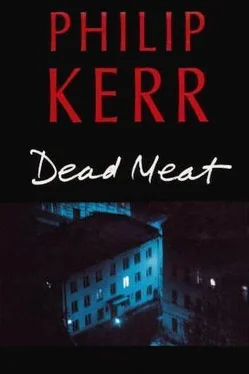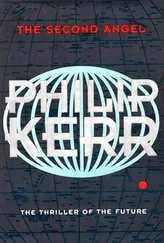‘No, not stronger,’ said Grushko. ‘Just better.’
‘I don’t know why I’m explaining myself to you,’ she said. ‘Or why you think you’re any better than those bastards in the KGB. Are your own hands really so very clean, Grushko?’
‘I can still look my friends in the eye.’
‘Then you’ve been lucky.’ Suddenly she seemed afraid. ‘Does anyone else—?’
‘You needn’t worry,’ he said cutting her off. ‘There’s just you and me and your conscience — if you have one.’
‘You know what I hope?’ she said. ‘I hope that one day you find out that someone close to you has betrayed you. I wonder if you’ll be more forgiving then.’
‘Oh, I can forgive you,’ said Grushko, snapping his fingers. ‘Just like that. But him?’ He pointed at Milyukin’s grave. ‘Well, I guess we’ll never know, will we?’
Tears welled up in Nina’s china blue eyes.
‘You cruel bastard.’
Grushko grinned. ‘A mind-reader as well as an informer. There’s no end to your talents.’
He left her standing there.
The newspapers say that suicide has become a political weapon. The conservatives in the Congress of People’s Deputies were quick to associate the collapse of the old system and economic hard times with an increase in the number of people taking their own lives. It was up ten per cent since 1987. If you were a democrat, would knowing that make you less inclined to kill yourself?
They also say that women are less inclined to commit suicide than men. Perhaps someone should have told Nina Milyukin. A few hours after her meeting with Grushko she drank a whole bottle of strong vinegar and died. It was a common, albeit painful method of killing yourself, if you could still find a bottle of strong vinegar in the shops. When several people telephoned Militia Station 59 to ask them where they might buy this vinegar, Lieutenant Khodyrev was forced to put out a statement saying that the bottle was an old one and had been in Nina Milyukin’s cupboard for several years.
The newspapers and television agreed that grief made her do it. Of course by then I knew different.
The heatwave ended a couple of days later. A cool breeze stirred the leaves of the poplar trees in the Summer Gardens where I had taken to walking and St Petersburg seemed like the most beautiful city on earth. It did not seem like the kind of city you would pick to commit suicide in.
When I discovered what Grushko had said to Nina Milyukin I was angry and told him I thought he had behaved abominably.
‘With a woman who betrayed her husband like that?’ he said. ‘I don’t think so.’
‘My wife betrayed me,’ I said, ‘but it doesn’t give me the right to judge her. God knows, maybe I drove her to it.’
‘That’s different,’ he said. ‘Nina Milyukin wasn’t just someone who failed in her duty as a wife. She failed in her duty as a human being. She was false. She lived the worst kind of lie.’
‘Where have you been?’ I said scornfully. ‘The whole bloody country’s been living a lie for the last seventy years. We have to put all of it behind us if we’re ever going to make it something better. And that includes the Nina Milyukins of this world.’
The more I thought about it the angrier I became.
‘You know what you did? You said what Mikhail Milyukin had purposely left unsaid. He knew she was spying on him, but he chose to stay silent. He felt it was better to have her reporting what he did to the KGB than not to have her at all.’
I shook my head sadly. ‘You’ve thrown away a valuable life,’ I told him. ‘I hope you can live with that.’
After that I stayed out of his way for a while, liaising with Vladimir Voznosensky at the State Prosecutor’s Office and busying myself with the preparation of the numerous cases we had against the Georgians and the Ukrainians. But at Sasha’s funeral he came up and took me aside for a minute.
‘You were right,’ he said. ‘There was no need to say what I said. It was unforgivable.’
‘I wasn’t right,’ I said, and told him how I had been planning to see more of Nina Milyukin. ‘But maybe we were both wrong.’
They gave Sasha a burial with full honours. A militia detachment fired a salute over his grave. And the city council gave his widow a cheque for two thousand roubles. It was just four months’ pay.
After the funeral several of us went back to Nikolai’s house for a drink. It wasn’t much of an evening. At an early stage Nikolai lifted a glass and said ‘Good health’, and Grushko glowered at him and replied, ‘Are we drinking, or talking?’ But gradually, as more vodka was consumed, things eased up just a bit and Grushko described how his daughter seemed determined to go and live in America.
‘Why should anyone want to go and live in America?’ he said. ‘That’s what I’d like to know.’ Then he looked at me meaningfully and added: ‘At least here you can always blame someone else when something goes wrong.’
As my reverie ended, the compartment door opened with a rush of air and noise and the carriage attendant came to offer us tea from her samovar. As if to atone for my poor company I paid for two glasses and handed one carefully to my attractive travelling companion. Then the door closed, leaving us alone once again.
She smiled. ‘Thank you.’
‘Where are you from?’ I asked her. For a moment she was silent, her hands cupped around her glass as she sipped the steaming hot tea.
‘From Moscow. I’m a ballerina. I was with the Kirov, but now I’m going back to the Bolshoy. What about you?’
‘I’m a policeman.’ Briefly I described my trip to St Petersburg.
I wondered whether or not to add that I had really been sent to St Petersburg as part of an undercover investigation, to look for any evidence of corruption in Grushko’s department. Perhaps these things are best left unsaid, even today when there is so much honesty and openness in government. Some people find it hard to understand this kind of work. But with all investigations into police corruption you have to put duty ahead of personal relationships. Like the time I had to pretend to be corrupt myself in order to trap another policeman. That wasn’t pleasant. The man, who lost his job and went to prison, had a wife and family. Besides, it was not as if I had found any evidence that Grushko and his men were on the take. Far from it. To me, it seemed that Kornilov had merely wished to be quite certain that his men were thoroughly honest. That was understandable. The nature of Grushko’s work made him and his men vulnerable to corruption. So I had little to feel too guilty about. After all, as Grushko himself would have agreed, an honest police force was the only way that the Mafia would ever be broken. Even so, I could have wished that there had been an opportunity for more honesty between us, although right to the last I think Grushko had always suspected who I was and what I was really up to.
I shrugged. Now it was me trying to make conversation. ‘I would have been driving back to Moscow now, except that the head gasket went on my car again.’
‘Again?’
‘Yes, I’d just got it back on the road after the last one went.’
She laughed, shook her head and the air was filled with the smell of her perfume which was like nothing I’d ever encountered before. That’s too bad.’
‘Well, at least I’ve had the chance of meeting you.’
‘Oh, there’s nothing much interesting about me.’
‘No? I should have thought being a dancer was interesting.’
She grimaced. ‘Hard work.’
‘I love the ballet. Someone in Central Board offered to get me tickets for the Kirov, only I never found the time to go.’
Читать дальше












